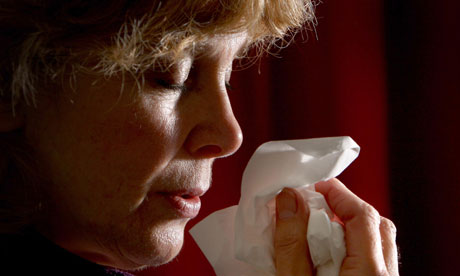
The number of people who have died with flu this winter has more than doubled and now stands at 112, the government said today.
All the deaths have occurred across the UK since September. The figure is up on the 50 cases reported last week and includes six children under five, nine aged five to 14 and 70 aged 15 to 64.
The Health Protection Agency (HPA) stressed that although the death toll had risen sharply, "most of these deaths did not occur in the past week. A substantial number of these 62 deaths occurred in December but due to the backlog over the seasonal holiday period they have only been confirmed this week".
The overall total of people who have died as a result of seasonal flu is likely to be higher still, the HPA added. "These figures represent only a proportion of those who may have died from flu or complications from flu, such as pneumonia, over the current flu season," the agency said.
"Precise figures for flu-related deaths each winter are not available but estimates based on excess all-cause mortality figures are typically in the region of 0-5,000, predominantly in people over 65 years of age."
Of 81 cases where information was available, 63 were in risk groups for flu because they were pregnant or had an underlying health condition such as asthma or diabetes, or had a compromised immune system. Ninety-five of the 112 had H1N1 swine flu. Despite this, health officials said they thought the outbreak was plateauing.
The number of people in critical care in England has fallen from 783 last week to 661.
Earlier this week, the parents of a healthy three-year-old girl who died from swine flu on Boxing Day after developing symptoms over Christmas called for all children to be vaccinated. Lana Ameen had not been eligible for the seasonal flu jab under current rules because she had no underlying health problems. Her mother, Gemma, said: "Everyone, even adults, not just children, has a right to protect themselves. The government should not be picking and choosing to say that person doesn't qualify to be protected against something."
The Department of Health insisted independent expert advice was "absolutely clear" that children who do not have risk factors should not be vaccinated.
The advice had been reviewed recently and the Joint Committee on Vaccination and Immunisation did not change its recommendation, it added.
The Royal College of GPs has said healthy people should be banned from having private flu vaccinations, which can be obtained from pharmacies for about £15, as concerns continue about supplies to treat at-risk groups, including pregnant women, children with health problems and over-65s. Old supplies from the 2009 swine flu outbreak are being used to plug the gap, because the H1N1 strain responsible remains among those circulating in Britain.
The Royal College of Midwives has claimed that a number of pregnant women were refused this season's flu vaccine in the autumn because GPs were not aware that they were among at-risk groups.
Seventeen people with flu have died in Scotland in the past week, Health Protection Scotland (HPS) said today. It confirmed that 55 people with laboratory-confirmed cases of influenza A (H1N1) needed intensive care treatment because of severe infection in the week ending 10 January.
Sixteen of those who died had swine flu while the other had influenza A.
Since the start of the flu season there have been 116 intensive care cases and 27 deaths, almost all of whom are understood to have been infected with swine flu.
The rate of GP consultations for flu-like illness across Scotland rose slightly last week to 55.8 per 100,000, compared with 52.2 per 100,000 the previous week.
This GP consultation rate continues to reflect normal seasonal influenza activity, HPS said.

